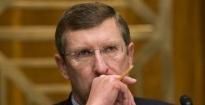Fear of interest rate hikes cloud deficit talks
Lawmakers are worried that uncertainty over a national default and concern over deficit spending could swell interest rates and cost the government over a trillion dollars in the next decade.
The wild card of interest rates has added a wrinkle in the debate over how much to slash spending and raise taxes to reduce the long-term national debt.
“If interest rates go up one percent, that adds 1.3 trillion dollars to the debt over the next ten years,” said Sen. Kent Conrad (D-N.D.), chairman of the Senate Budget Committee. “Anybody that thinks somehow those of concerned over the deficit and debt is [participating in] some kind green eyeshade exercise. No.”
Sen. Rob Portman (R-Ohio), who served as White House budget director under former President George W. Bush, shares Conrad’s worry.
“It’s a big concern. Think about it. A one-percent increase in interest rates means more than $100 billion more in deficit spending,” Portman said. “The lack of confidence in the ability of Washington to deal with our historic deficits and debts [means] that investors could ask for a higher rate of return to invest in our country.”
Congressional Budget Office Director Douglas Elmendorf sounded the alarm at a breakfast with reporters Tuesday. He warned that if interest rates on Treasury securities increase by only a tenth of a percentage point, it would increase the cost of borrowing by $130 billion over ten years. His remarks were quickly noted on Capitol Hill.
Concerns over interest rates gained some momentum after Tuesday’s fairly steep sell-off in Treasuries, which pushed the yield on the10-year Treasury note to 3.1 percent. Even though that was well below February’s 3.75-percent high mark, it served as an unpleasant reminder of potential volatility.
The interest rates on Treasury securities depend on several factors, but one of the most important is the confidence of investors that they’ll be paid back. The hardening lines in negotiations over raising the national debt-limit and the projected long-term debt has undermined this confidence.
This has spurred even the most partisan lawmakers to call for a quick resolution to the impasse over extending the nation’s borrowing authority. If Vice President Joe Biden and congressional leaders fail to reach a deal by Aug. 2, they risk a default.
“The sooner and quicker we settle the debt-ceiling, the better it will be,” said Sen. Chuck Schumer (D-N.Y.).


